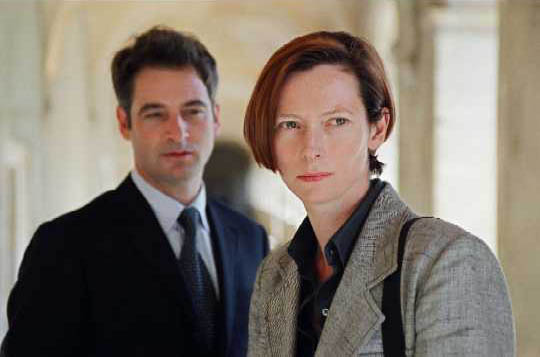|
Reviews of Recent Independent, Foreign, & Documentary Films in Theaters and DVD/Home Video
THE STATEMENT
Against the inside politics of religion and government, Norman Jewison's latest film focuses on
Pierre Brossard (Caine), a French WWII war criminal who, amidst the Vichy government's
collaboration with the Nazi regime, was responsible for the deaths of seven Jews. The film
begins with a flashback of this event and then transports us immediately to the present where we
now find Brossard living in obscurity, residing within the sanctum of a French
abbey. However, his anonymity evaporates - a hit man has discovered his whereabouts, and soon
after Brossard is charged with crimes against humanity. Pursued by both a killer and the police,
Brossard is forced into running for his own survival while haunted by a past that can no longer
hide securely behind Fatherly love and protection. In a balanced portrayal of both a predator
and prey, Michael Caine makes you waver between wanting him to get away and to get his
comeuppance. While we recognize his tendencies towards sadism and prejudice, we also
recognize his present powerlessness against a system just as ruthless and deceptive. Only his
character, however, undergoes any character development. The other cast members (including
Tilda Swinton, Jeremy Northam, and Charlotte Rampling) turn in fine performances, but their
roles are unfortunately relegated more to the circumstances of the chase and less on insights into
their psyches and relationships. When the film does attempt to flesh out some of these latter
elements, much of the dialogue feels expository, as if constructed out of an obligation to fill in
the holes, rather than to unfold undetected within the dramatic action. And holes there are when
it comes to making sense of the multiple factions of religious orders, branches of government,
and positions of state and clergy. Though beset with similar problems, the novel
makes better use of its narrative, grounding the characters within their individual conflicts and
making clearer their battles for power against the underlying issues of individual and national
conscience. As a result, The Statement becomes more of a confusing than a reflective look at
what the past has wrought on Pierre and France - its game of cat-and-mouse overshadows its
attempts at self-reflection. Max Rennix, actor/writer based in New York
|
